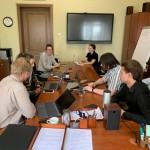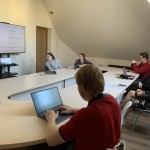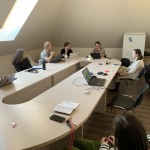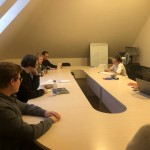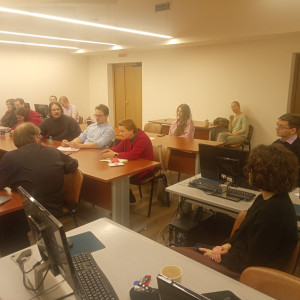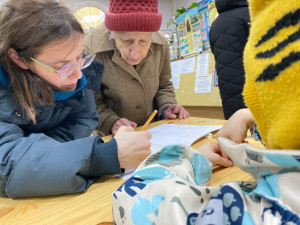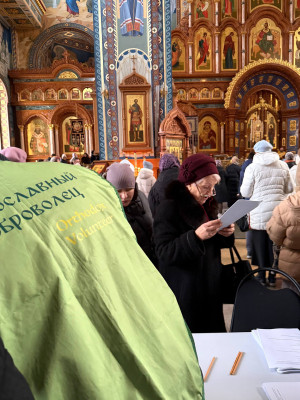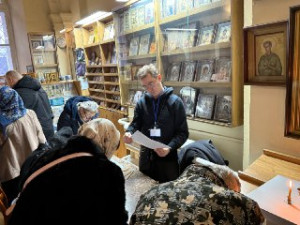 Project: Orthodox Monitor Sociological Survey: Orthodox Christianity in Contemporary Russia. Attitudes towards the Russian Orthodox Church
Project: Orthodox Monitor Sociological Survey: Orthodox Christianity in Contemporary Russia. Attitudes towards the Russian Orthodox Church
Funding: Supported by the PSTGU Development Fund and the Living Tradition Foundation, 2025–2028
Project period: 2025–2028
Project investigator: Elena Prutskova
Research team: Valeria Elagina, Olga Borisova, Yana Mikhaylova, Kirill Markin, Veniamin Lidsky, Mikhail Baikov, Vasily Tazin, Yuri Slastya
About the project
The Orthodox Monitor is a monitoring study that aims to collect specific data on (1) the population of Russian Orthodox Christians and (2) on Russians’ attitudes towards the Russian Orthodox Church. The regularity of the surveys allows for tracking the dynamics of the religious domain. The survey questionnaire includes the core module and ad hoc thematic sections. The Orthodox Monitor project was launched in 2011–2012. The first wave was focused on Russians’ attitudes towards the Russian Orthodox Church, motives for participation and non-participation in church life, basic values, and social capital. The research design was based on representative general population sample and representative churched Orthodox sample. “Religion and the Church” surveys were conducted in 2020–2021 as part of the «Social Work of the Russian Orthodox Church: Factors of Development and the Problem of Institutionalization» research project supported by Russian Presidential Grants Foundation. This wave explored social capital, attitudes toward and participation in the social initiatives of the Church. Notably, the survey revealed opposed views on social work among the general population, beneficiaries of the social programs, Church officials responsible for coordinating social initiatives, and ordinary social workers employed by the Church. Conferences and seminars held as part of the research project helped to launch an interdisciplinary dialogue on issues related to the social work projects of the Church. They also provided a platform for discussing the key research findings with interested representatives of the scientific community as well as with social workers. These discussions featured sociologists, philosophers, religious scholars, theologians, and organizers of media and social projects.
According to the national representative survey conducted in 2020, religious life has intensified compared to 2011 on most measured indicators. However, it is unclear whether this increase in religiosity was related to the COVID-19 pandemic, whether it has returned to previous levels, or if it has continued to grow over the past five years.
The next wave of the project, in 2025–2028, will focus on issues of religion and family (interaction within the extended family; traditional values; family values and attitudes toward the family; fertility factors; religious socialization; intergenerational transmission of religiosity).
Seminars
Seminar № 1. 05.09.2025
As part of the third wave of the Orthodox Monitor project, a research seminar was launched at the Laboratory of Sociology of Religion. The first meeting focused on a survey of both churchgoing and non-churchgoing respondents. The discussion was based on an earlier version of the questionnaire that had been developed for the 2020 study. The seminar’s main task was to identify thematic blocks for adjustment or exclusion from the current questionnaire. Questions concerning godparenthood, family and the social activities of Russian Orthodox parishes will be edited. The sections recording socio-demographic indicators and the degree of religiosity will remain unchanged. At subsequent seminars, colleagues will present reports on which new thematic sections for the questionnaire will be developed.
Seminar № 2. 12.09.2025
On September 12, the second meeting of the scientific seminar of the Orthodox Monitor project was held at the Sociology of Religion laboratory, during which presentations by V. Lidsky and V. Tazin were heard and a focused discussion unfolded about introducing new concepts into the study questionnaire. V. Lidsky presented the topic of declarative and non-declarative trust and together with other participants discussed possible ways to operationalize these concepts in questions and scales, as well as validation issues; V. Tazin concentrated on the phenomenon of divine abandonment, outlined approaches to its measurement, including Glaz’s subscale, and raised methodological and ethical questions, in particular regarding the emotional burden of certain formulations. As a result of the discussion, participants decided to refine wording and scales, strengthen validation procedures, and review items that may prove excessively burdensome for respondents. Further work on revising the questionnaire will continue at subsequent meetings.
Seminar № 3. 17.09.2025
At the third seminar of the Orthodox Monitor project at the Laboratory of Sociology of Religion, Elena Prutskova presented a report dedicated to the analysis of motives for church attendance.
The discussion focused on differences between classical models of religiosity and the results of Russian surveys. Based on survey data and factor analysis, the speaker identified six types of motivation: social service, intellectual, emotional, social-family, ethnodoxy, and general religiosity. Particular attention was drawn to the growing importance of the intellectual component – the search for answers to questions about the meaning of life and agreement with church teaching. Participants discussed the dynamics of changes in motives from 2012 to 2021, as well as the influence of gender, education, and material status. Women were more likely to mention emotional grounds, while highly educated respondents emphasized intellectual ones. The seminar also touched upon methodological issues: the need to clarify the wording of motives, the possibility of introducing new items into the questionnaire, and the operationalization of the concept of ‘sacred individualism.’ Future meetings will feature presentations by Olga Borisova and Veniamin Lidsky, which will serve as the basis for revising the questionnaire for the third wave of the project.
Seminar № 4. 24.09.2025
At the fourth seminar of the Orthodox Monitor project in the laboratory “Sociology of Religion”, Olga Borisova presented a report on the consideration of the extended family as an alternative to the normative model of the nuclear family. It was suggested that questions related to the study of the expression and boundaries of a large family, family consciousness and family solidarity should be included in the questionnaire.
After the report, a discussion was held to summarize the work done and determine which dependent variables are proposed for regression analysis and which variables and indexes are needed to be included in the models to predict them.
Seminar №5 01.10.2025
At the fifth seminar, Yuri Slastya delivered a presentation addressing fertility issues and the intergenerational transmission of childbearing experiences within parental families. To identify factors influencing the reproductive behavior of respondents, the study included questions about their siblings, the composition of their parental family, and both their desired and actual number of children. Additionally, to elucidate the role of religion in shaping the experience of having multiple children, questions were designed to assess the religiosity of the respondents’ spouses.
Seminar №6, 08.10.2025
At the sixth seminar of the Orthodox Monitor project, Valeriya Elagina delivered a report on the concept of justice, featuring a hypothetical survey model for an upcoming questionnaire. The report presented the semantic ambiguity of the term itself, as well as its contradictory interpretation within the context of the Orthodox tradition. On one hand, justice might be perceived as a less significant virtue compared to love and mercy, or even be evaluated negatively. On the other hand, justice is undoubtedly manifested in various aspects of Orthodox and Christian life: from the concept of Divine judgment and the functioning of canon law to the practices of parish resource distribution and conflict resolution. An analysis of doctrinal documents of the Russian Orthodox Church revealed that the concept of “justice” is mentioned approximately 25 times, underscoring its relevance for the Church. The possibility of applying the concept of distributive justice to the analysis of family relationships was proposed, particularly concerning the distribution of household duties and inheritance
Seminar № 7 15.10.2025
On October 15, the Sociology of Religion laboratory hosted another meeting of the Orthodox Monitor project’s research seminar, featuring a presentation by V. Lidsky titled “The Relationship Between Trust and Reproductive Expectations.” The seminar sparked an in-depth discussion on the role of institutional trust in shaping reproductive attitudes. V. Lidsky presented two competing theoretical models explaining both the positive and negative influence of generalized trust on childbearing plans, also proposing non-declarative (pre-reflexive) trust as a moderator of this influence. Using educational organizations as an example, participants delved into the specifics of institutional trust and its connection to verified knowledge about institutional operations, as well as methodological challenges in operationalizing complex concepts and testing the proposed models. Following the discussion, it was decided to refine the conceptual model and its operationalization for subsequent empirical testing within the quantitative study. Further work on the questionnaire will continue at upcoming meetings.
Seminar № 8. 20.10.2025
At the eighth meeting of the Laboratory of Sociology of Religion concerning the Orthodox Monitor project, Olga Borisova delivered a presentation on the operationalization of the concept of ‘family consciousness’ within the preparation of the third wave of the study.
The speaker proposed approaches to measuring the importance of family and the types of family ties, combining normative and practical indicators. The discussion focused on ways to include questions about joint activities, care, and intergenerational support, as well as on the possible use of the ‘kin-keeper’ scale to assess the role of maintaining family connections.
Participants emphasized the importance of accounting for diverse family forms and balancing questionnaire length with conceptual clarity. It was decided to pilot the new block of questions and compare it with previously used family attitude scales.
Future meetings will feature presentations by Yana Mikhailova and Yuri Slastya.
Seminar №9, 23.10.2025
At the ninth seminar of the Orthodox Monitor project in the laboratory “Sociology of Religion”, a presentation by Yuri Slastya was held on possible models of the influence of religiosity and childhood environment on fertility.
The speaker suggested separating current religiosity and religious socialization and evaluating the former as a mediator of the moderator in the fertility prediction model. Also, the number of children in the parental family can be moderated by religiosity and religious socialization, and influence fertility through environmental characteristics in terms of support and prevalence of childhood.
During the discussion, it was decided to also include the characteristics of the spouse’s family in the analysis to predict the birth rate of the family. And to test various configurations of mediators and moderators in the fertility prediction model.
Future meeting will feature presentation by Yana Mikhailova.
Relevant news

